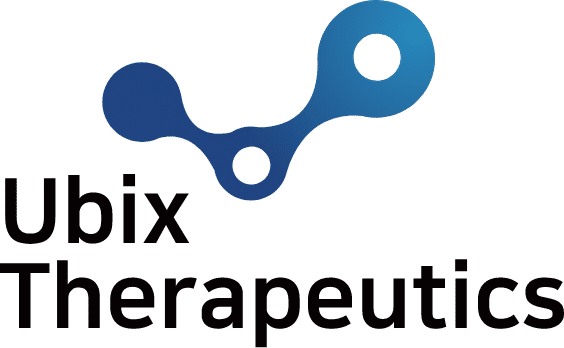预约演示
更新于:2025-05-07

Ubix Therapeutics Co. Ltd.
更新于:2025-05-07
概览
标签
肿瘤
免疫系统疾病
血液及淋巴系统疾病
蛋白水解靶向嵌合体(PROTAC)
小分子化药
化学药
疾病领域得分
一眼洞穿机构专注的疾病领域
暂无数据
技术平台
公司药物应用最多的技术
暂无数据
靶点
公司最常开发的靶点
暂无数据
| 排名前五的药物类型 | 数量 |
|---|---|
| 蛋白水解靶向嵌合体(PROTAC) | 7 |
| 小分子化药 | 6 |
| 化学药 | 1 |
关联
14
项与 Ubix Therapeutics Co. Ltd. 相关的药物靶点 |
作用机制 BTK抑制剂 |
非在研适应症- |
最高研发阶段临床1期 |
首次获批国家/地区- |
首次获批日期- |
靶点 |
作用机制 SOS1抑制剂 |
非在研适应症- |
最高研发阶段临床前 |
首次获批国家/地区- |
首次获批日期- |
靶点 |
作用机制 Bcr-Abl抑制剂 |
非在研适应症- |
最高研发阶段临床前 |
首次获批国家/地区- |
首次获批日期- |
1
项与 Ubix Therapeutics Co. Ltd. 相关的临床试验NCT06590961
A Phase Ia/Ib, Open-label, Dose-escalation, and Dose-expansion Study to Evaluate the Safety, Pharmacokinetics and Pharmacodynamic of UBX-303061 in Subjects with Relapsed/Refractory B-Cell Malignancies
This is a first-in-human Phase 1a/1b multicenter, open-label study designed to evaluate the safety and anti-cancer activity of UBX-303061 in patients with relapsed/refractory B-cell malignancies.
开始日期2025-02-20 |
申办/合作机构 |
100 项与 Ubix Therapeutics Co. Ltd. 相关的临床结果
登录后查看更多信息
0 项与 Ubix Therapeutics Co. Ltd. 相关的专利(医药)
登录后查看更多信息
4
项与 Ubix Therapeutics Co. Ltd. 相关的文献(医药)2025-04-21·Cancer Research
Abstract 1661: Discovery of an SHP2 degrader with potent anti-cancer activity as a monotherapy and exceptional combination effects in KRAS mutant cancers
作者: Han, Jeonghwa ; Kim, So Hyuk ; Kang, Ju Young ; Park, Ji Youn ; Lee, Song Hee ; Ryu, Je Ho ; Lee, Jihye ; Kim, Hyun-Hwi ; Lee, Soohyun ; Kim, Jiyoung ; Suh, Beomseon ; Kim, Han Wool ; Bae, Onnuri
2025-04-21·Cancer Research
Abstract 7009: Discovery of UBX-306 as a potent, selective, and orally bioavailable HPK1 degrader
作者: Ryu, Je Ho ; Lee, Song Hee ; Yoo, Sun-Mi ; Jang, Miyoung ; Choi, Ae-Ran ; Kim, Hyun-Hwi ; Jeong, Na-rae ; Im, Sun-Kyoung ; Lee, Hohyun ; Ahn, Jungmin ; Kim, So Hyuk ; Kim, Han Wool
2024-03-22·Cancer Research
Abstract 6069: Discovery and preclinical development of orally bioavailable potent BTK degrader, and its early clinical development for the treatment of relapsed and refractory B-cell malignancies
作者: Lee, Song Hee ; Lim, Ye Seul ; Yoo, Sun-Mi ; Lim, Jong Hwan ; Ryu, Je Ho ; Kim, Han Wool
11
项与 Ubix Therapeutics Co. Ltd. 相关的新闻(医药)2024-12-30
·创鉴汇
▎药明康德内容团队编辑
据创鉴汇不完全统计,上周(12月23日至12月29日)全球大健康领域共披露融资事件12起,总额近18亿元。按照金额划分,亿元及以上融资9起。按照已披露的融资轮次划分,早期融资(B轮以前)3起,中后期融资(B轮及以后)7起。生物医药领域共8家公司获融资,涉及药物类型包括蛋白降解疗法、小核酸药物等。
#01
浩博医药完成7300万美元B轮融资
关键词:小核酸药物
最新融资:7300万美元B轮
本轮投资机构:鼎晖创新与成长基金、汉康资本、启明创投、夏尔巴投资、元生创投等
12月27日,浩博医药宣布完成7300万美元B轮融资。本轮融资将主要用于推进核心小核酸创新药物AHB-137的中国和国际临床试验,以及早期商业化的准备工作。此外,资金还将支持公司新研发管线的拓展及团队的持续发展和建设。
公开资料显示,浩博医药关注于HBV慢性乙肝功能性治愈和针对肝脏疾病的高效靶向治疗,并拓展了对肝脏以外新靶点的靶向小核酸治疗。该公司研发的具有乙肝“功能性治愈“潜力的非偶联型反义寡核苷酸(ASO)药物AHB-137注射液已经被中国NMPA纳入突破性治疗品种,目前该产品处于2期临床研究阶段。在临床前研究中,它可以激发所有乙肝病毒RNA的降解,并且显著降低乙型肝炎表面抗原(HBsAg)水平。
#02
华奥泰生物完成2亿元增资
关键词:大分子药物
最新融资:2亿元未知轮
本轮投资机构:海璟创投
12月25日,华奥泰生物完成2亿元融资增资,由海璟创投独家投资。华奥泰生物成立于2013年,为华海药业旗下专注大分子药物的子公司,目前已经建立起覆盖单抗、双抗、融合蛋白及抗体偶联药物等多种药物形式的丰富研发管线。从回购条款可以看到华奥泰生物未来3-5年的经营目标,包括3年内完成一款产品获批上市,一款产品开展关键三期临床,一款产品进入2/3期临床,5年内完成两款产品获批上市,两款产品进入临床2/3期临床,以及约定时间实现首次公开募股(IPO)等。
#03
Ubix Therapeutics获257亿韩元Pre-IPO轮融资
关键词:蛋白降解疗法
最新融资:257亿韩元Pre-IPO轮
本轮投资机构:Solidus Investment、TONY Investment、Union Investment Partners、韩国科技信贷担保基金、兴业银行等
12月25日,专注于开发靶向蛋白质降解(TPD)疗法的生物技术公司Ubix Therapeutics宣布,其已通过Pre-IPO轮吸引了价值257亿韩元的投资。本次Pre-IPO获得的资金将用于UBX-303-1在美国和韩国的临床开发、新药物管线的扩张,以及加快IPO的准备工作等。
基于对人类免疫系统和靶蛋白的研究和理解,Ubix Therapeutics正在开发新的抗癌疗法。临床阶段候选药物UBX-303-1是一款BTK降解剂,通过降解过表达的BTK蛋白来发挥作用,并且具有与其他现有BTK抑制剂不同的独特作用机制,即分解和去除细胞中的BTK蛋白,这有望带来整体优势,特别是克服耐药性和增加选择性方面具有优势。UBX-303-1已经在非临床研究中表现出良好的PK/PD谱,在C481S突变型异种移植小鼠模型和野生型中均表现出较好的抗癌效果。Ubix Therapeutics期望UBX-303-1能够解决B细胞相关疾病(包括CLL和DLBCL)未满足的医疗需求,并扩大至免疫疾病适应症。
#04
Rznomics获203亿韩元Pre-IPO轮融资
关键词:RNA编辑
最新融资:203亿韩元Pre-IPO轮
本轮投资机构:Aon、KB Investment、QUAD Investment Management、三星创投(Samsung Ventures)、Yuanta Investment
12月23日,开发基于RNA的基因疗法的生物技术公司Rznomics宣布,已通过Pre-IPO完成吸引203亿韩元的投资。至此,Rginumix迄今为止已获得总计812亿韩元的投资,并获得了约90亿韩元的政府资助研究资金。
Rgnomics的核心平台是基于RNA转拼核酶的RNA编辑技术,其概念是RNA替代酶靶向并切割特定的RNA,同时用治疗性RNA替换切割位点。该公司表示,与现有的DNA/RNA编辑技术不同,它不需要外部蛋白质或内部细胞工具,与编辑特定基因突变的碱基编辑技术相比,具有能够治疗更广泛种类突变的优势。主要疾病是癌症和罕见的无法治愈的遗传病。
#05
Pin Therapeutics宣布已完成约200亿韩元C轮融资
关键词:蛋白降解疗法
最新融资:约200亿韩元C轮
本轮投资机构:CKD Venture Capital Corporation、DSC Investment、KB Investment、Korea Development Bank 、Korea Investment Partners
12月23日,靶向蛋白降解疗法(TPD)生物科技公司Pin Therapeutics宣布已完成约200亿韩元C轮融资。通过这项投资,Pin Therapeutics计划于2025年在美国和韩国推进主导项目CK1α选择性分子胶降解剂(MGD)PIN-5018进入1期临床试验。
Pin Therapeutics成立于2017年,是一家专注于靶向蛋白降解领域的生物技术公司,其正在开发新的平台和筛选系统,分别称为“PinE3”(用于新型E3连接酶)和“PinGLUE”(用于新型分子胶降解剂)平台,旨在解决当前TPD技术的局限性,并开发有临床应用前景的候选药物管线。目前,Pin Therapeutics正在开发两款候选药物,包括CK1α选择性分子胶降解剂(MGD),以及一款与大熊制药(Daewoong)联合开发的具有双重机制的PROTAC候选药物。
读者们请星标⭐创鉴汇,第一时间收到推送
免责声明:药明康德内容团队专注介绍全球生物医药健康研究进展。本文仅作信息交流之目的,文中观点不代表药明康德立场,亦不代表药明康德支持或反对文中观点。本文也不是治疗方案推荐。如需获得治疗方案指导,请前往正规医院就诊。
版权说明:本文由药明康德内容团队根据公开资料整理编辑,欢迎个人转发至朋友圈,谢绝媒体或机构未经授权以任何形式转发/复制至其他平台。转发授权请在「创鉴汇」微信公众号留言联系我们。
更多数据内容推荐
点击“在看”,分享创鉴汇健康新动态
IPO临床2期临床3期
2024-12-27
·医药观澜
▎药明康德内容团队报道
近日,专注于开发靶向蛋白质降解(TPD)疗法的生物技术公司Ubix Therapeutics宣布,其已通过Pre-IPO轮吸引了价值257亿韩元的投资。本次Pre-IPO获得的资金将用于UBX-303-1在美国和韩国的临床开发、新药物管线的扩张,以及加快IPO的准备工作等。
基于对人类免疫系统和靶蛋白的研究和理解,Ubix Therapeutics正在开发新的抗癌疗法。该公司的Degraducer®是一项基于泛素-蛋白酶体系统(UPS)的技术平台,基于该平台可以研发一种双功能分子,将与目标蛋白结合的“配体”和与E3泛素连接酶结合的“结合剂”通过连接子连接。通过将疾病相关的靶蛋白放置在E3连接酶附近,从而实现靶向蛋白质降解和随之而来的治疗效果。
Ubix Therapeutics公司的临床阶段候选药物UBX-303-1是一款BTK降解剂,通过降解过表达的BTK蛋白来发挥作用,并且具有与其他现有BTK抑制剂不同的独特作用机制,即分解和去除细胞中的BTK蛋白,这有望带来整体优势,特别是克服耐药性和增加选择性方面具有优势。UBX-303-1已经在非临床研究中表现出良好的PK/PD谱,在C481S突变型异种移植小鼠模型和野生型中均表现出较好的抗癌效果。Ubix Therapeutics期望UBX-303-1能够解决B细胞相关疾病(包括CLL和DLBCL)未满足的医疗需求,并扩大至免疫疾病适应症。
Ubix Therapeutics还正在对E3连接酶的新机制以及已知的E3连接酶的结合物如CRBN、VHL、IAP等进行研究,并将其应用于药物研发。此外,该公司正在从各个角度开发新技术,包括与Debiopharm公司共同开发的抗体分解药物偶联物(antibody-decomposing drug conjugates,ADeC)。
参考资料:
[1]유빅스, pre-IPO 257억.."BTK 분해약물 임상개발". Retrieved Dec 23,2024, From https://www.biospectator.com/news/view/23915
[2]Ubix官网.From http://ubixtrx.com/science
本文来由药明康德内容团队根据公开资料整理编辑,欢迎个人转发至朋友圈。转发授权及其他合作需求,请联系wuxi_media@wuxiapptec.com。
免责声明:药明康德内容团队专注介绍全球生物医药健康研究进展。本文仅作信息交流之目的,文中观点不代表药明康德立场,亦不代表药明康德支持或反对文中观点。本文也不是治疗方案推荐。如需获得治疗方案指导,请前往正规医院就诊。
IPO抗体药物偶联物
2024-10-08
SEOUL, South Korea I October 08, 2024 I
Ubix Therapeutics, Inc., a clinical-stage biotechnology company dedicated to the discovery and development of innovative oncology therapeutics using Targeted Protein Degradation (TPD) technology, announced today its acceptance as a member of the Johnson & Johnson Innovation – JLABS (JLABS) Korea community.
JLABS is one of the largest global networks of health incubators pioneering the next wave of healthcare solutions with early-stage innovators. Powered by Johnson & Johnson, JLABS empowers its member companies working across the spectrum of healthcare with the experience, mentorship, partnerships and venture connections to accelerate their science.
Ubix Therapeutics is currently conducting a phase 1 clinical trial for UBX-303-1, an oral small molecule degrader targeting B cell malignancies. In July, the company inked a license agreement granting Yuhan Corporation the rights to develop and commercialize AR degrader UBX-103, a prostate cancer drug candidate.
“Our acceptance into JLABS is a tremendous opportunity for us to accelerate our R&D efforts.” said BK Seo, CEO of Ubix Therapeutics. “We plan to leverage the membership to further advance our pipeline, including UBX-106, a SHP2 degrader program set to enter IND-enabling studies, and to strengthen our efforts in building global partnerships.”
About Ubix Therapeutics, INC.
Ubix Therapeutics is a biotechnology company dedicated to discovery and development of TPD therapeutics. Ubix’ proprietary TPD platform technology, Degraducer®, leverages the body’s own natural protein degradation machinery to eliminate diseased proteins, thereby leading to near-complete inactivation of disease-causing pathways. Ubix’ wholly owned TPD pipeline includes its clinical program UBX-303-1, a BTK degrader for treatment of relapsed or refractory B cell malignancies, UBX-106, a SHP2 degrader set to enter IND-enabling studies for MAPK signaling dependent cancers, and multiple other preclinical and research stage degrader assets in targeted and immuno-oncology. For additional information, please visit
http://en.ubixtrx.com
SOURCE:
Ubix Therapeutics
临床1期引进/卖出蛋白降解靶向嵌合体
100 项与 Ubix Therapeutics Co. Ltd. 相关的药物交易
登录后查看更多信息
100 项与 Ubix Therapeutics Co. Ltd. 相关的转化医学
登录后查看更多信息
组织架构
使用我们的机构树数据加速您的研究。
登录
或

管线布局
2026年02月07日管线快照
管线布局中药物为当前组织机构及其子机构作为药物机构进行统计,早期临床1期并入临床1期,临床1/2期并入临床2期,临床2/3期并入临床3期
药物发现
5
8
临床前
临床1期
1
登录后查看更多信息
药物交易
使用我们的药物交易数据加速您的研究。
登录
或

转化医学
使用我们的转化医学数据加速您的研究。
登录
或

营收
使用 Synapse 探索超过 36 万个组织的财务状况。
登录
或

科研基金(NIH)
访问超过 200 万项资助和基金信息,以提升您的研究之旅。
登录
或

投资
深入了解从初创企业到成熟企业的最新公司投资动态。
登录
或

融资
发掘融资趋势以验证和推进您的投资机会。
登录
或

生物医药百科问答
全新生物医药AI Agent 覆盖科研全链路,让突破性发现快人一步
立即开始免费试用!
智慧芽新药情报库是智慧芽专为生命科学人士构建的基于AI的创新药情报平台,助您全方位提升您的研发与决策效率。
立即开始数据试用!
智慧芽新药库数据也通过智慧芽数据服务平台,以API或者数据包形式对外开放,助您更加充分利用智慧芽新药情报信息。
生物序列数据库
生物药研发创新
免费使用
化学结构数据库
小分子化药研发创新
免费使用